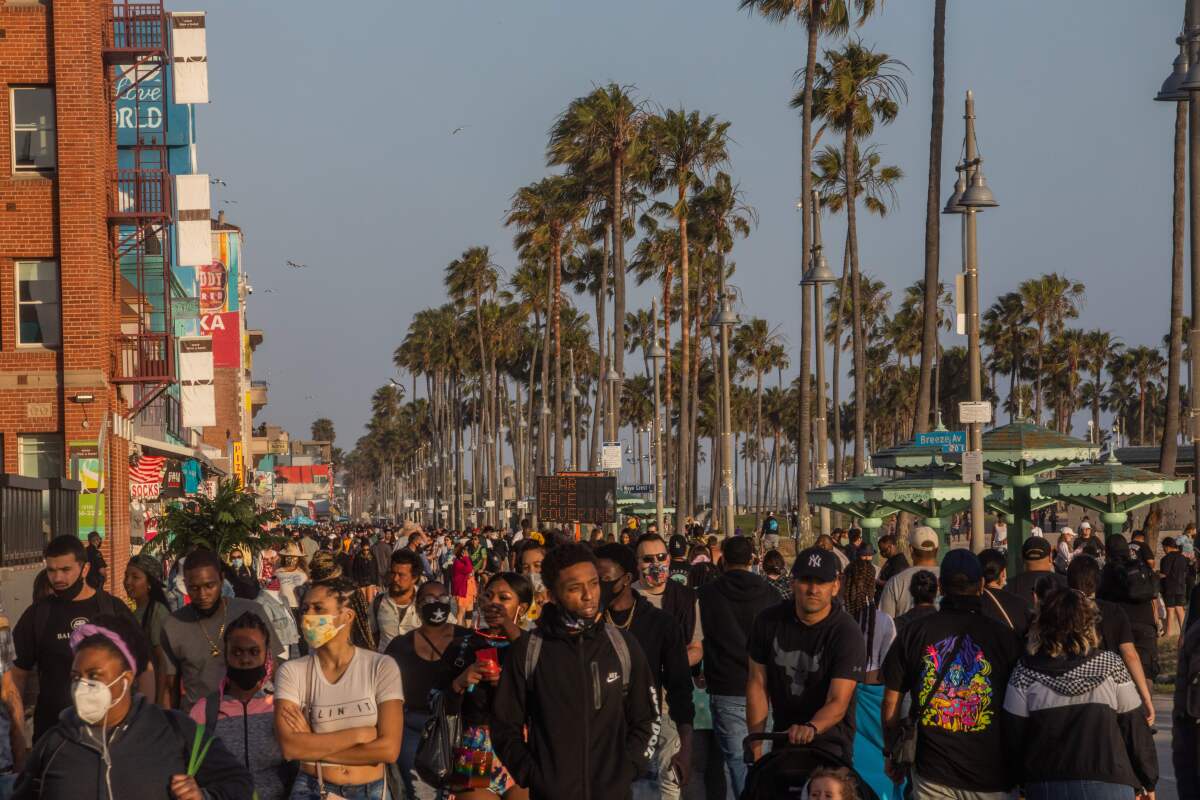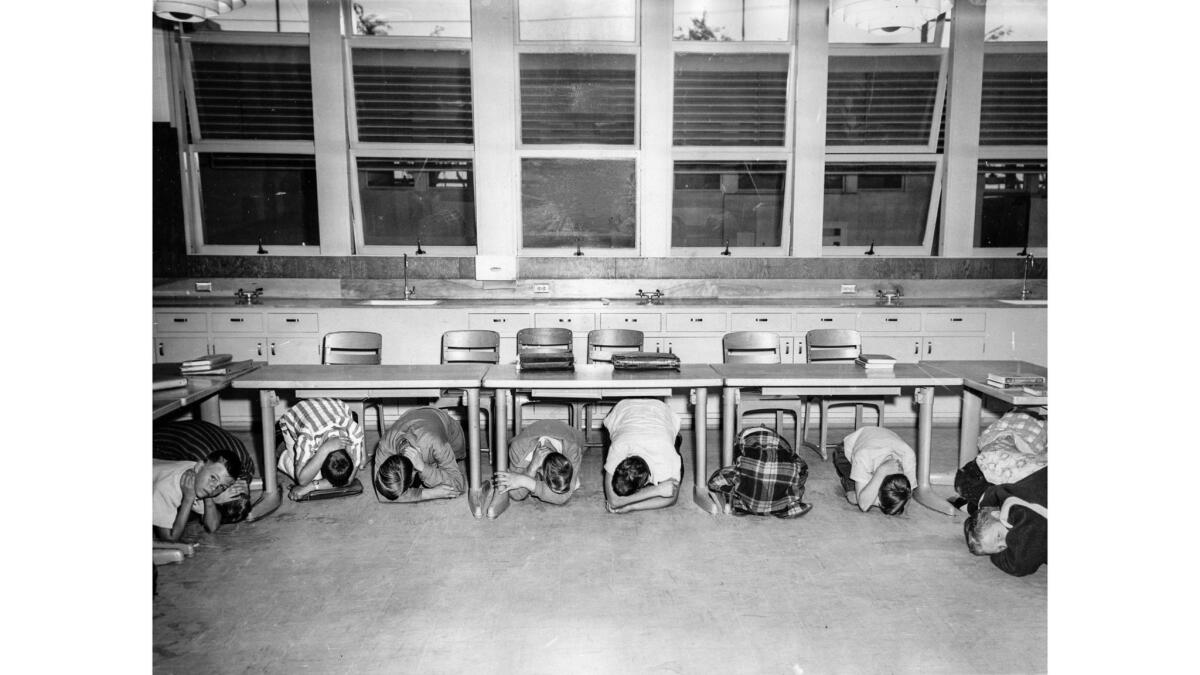Newsletter: A silent threat amid reopening

- Share via
As California and the rest of the U.S. reopen, a silent coronavirus threat still looms.
TOP STORIES
A Silent Threat Amid Reopening
Officials around the U.S. have been reopening public spaces, businesses and other institutions at a rapid clip over the last several days.
In California, as the state nears 100,000 confirmed cases of COVID-19, Gov. Gavin Newsom has announced that counties can begin to reopen hair salons and barbershops, marking a transition to the third stage of a plan to ease his stay-at-home order. That guidance doesn’t yet apply in Los Angeles County, though retail stores and religious institutions can now begin reopening with safety restrictions.
Start your day right
Sign up for Essential California for the L.A. Times biggest news, features and recommendations in your inbox six days a week.
You may occasionally receive promotional content from the Los Angeles Times.
Experts say those restrictions — including physical distancing, face masks and a limit on the number of people in confined spaces — are especially important to follow because of “silent spreaders”: people who have the virus but do not show symptoms.
They could be strolling along a beach or marching up a hiking trial and look perfectly healthy — but still pass along the virus that causes COVID-19 to others.
Even loud talking can emit thousands of saliva droplets per second. Researchers recently found that, in a stagnant air environment, droplets of fluid sprayed from the mouth remained in the air for as long as eight to 14 minutes before drying up.
Definitely Not Old School
Sixteen students to a class. One-way hallways. Students lunch at their desks. Children could get one ball to play with — alone. Masks are required. A staggered school day.
These campus scenarios could play out based on new Los Angeles County school reopening guidelines. The 45 pages of planning would affect 2 million students and their families as educators undertake a challenge forced on them by the coronavirus crisis: fundamentally redesigning the traditional school day.
The safe reopening of schools in California and throughout the nation compels the reimagining — or abandoning — of long-held traditions and goals of the American school day, where play time, socialization and hands-on support have long been essential to the learning equation in science labs, team sports, recess and group work.
More Top Coronavirus Headlines
— Nevada’s governor said Las Vegas’ dozens of resorts, along with hotel-casinos throughout the state, can reopen June 4.
— Is Georgia‘s relaxed approach to the coronavirus working? Between partisan tensions and data flubs, it’s a matter of fierce debate.
— Orange County supervisors have declared religious services “essential” and expressed concerns that Newsom’s plan to reopen places of worship with major restrictions is too constraining for megachurches and other large institutions.
— The NHL has unveiled a plan to complete the 2019-20 season, confirming a 24-team restart format. It wouldn’t include the Kings or Ducks.
For more, sign up for Coronavirus Today, a special edition of The Times’ Health and Science newsletter.
Battle of the Ballots
Facing a potentially difficult path to reelection, President Trump has expanded his attacks on states using mail-in ballots. It’s a scorched-earth campaign that could undermine confidence in the democratic process, as the novel coronavirus threatens to make in-person voting more dangerous.
The president targeted California in particular, falsely accusing the state of distributing ballots to “people who aren’t citizens, illegals” and “anybody who is walking or breathing.” Citing no proof, he warned that people would print fake ballots and send them in “by the hundreds of thousands.”
At the same time, Republican leaders around the country are running aggressive field operations to encourage supporters to cast ballots by mail, a practice that has been widespread for years, with only rare cases of fraud.
And in another twist, Twitter for the first time added a disclaimer to the bottom of one of Trump’s tweets, urging voters to “get the facts about mail-in ballots” and providing research as to why Trump’s claims are baseless. Trump responded by accusing Twitter of interfering in the election.
Flipping the Script
As conservative conspiracy theories and “deep fake” videos race through the internet, defying the fact-checkers and bruising political candidates, Curtis Hougland is trying to fight back by borrowing from the playbook of his adversaries.
Hougland, a technologist and online-extremism expert, is hiring small armies of social-media mercenaries to do battle for Democrats.
These are not troops predisposed to political warfare. They are typically not aligned with the progressive candidate or cause that Hougland’s firm, Main Street One, is representing. But they hold a weapon that’s lacking among internet activists in the echo chambers of the left: large and devoted followings of persuadable voters.
FROM THE ARCHIVES
In the 1950s, Americans so feared that the nuclear weapons they’d helped develop would come back to harm them, schools ran atomic bomb drills.
According to The Times, children in public schools were taught to “stand up suddenly at a given signal by the teacher and kneel beside adjoining desks with heads buried in their arms.” The threat was described as “a bomb that blows up houses and makes the earth wiggle.” This 1957 photo shows students from Hosler Junior High School in Lynwood practicing during what was known as a “civil defense drill.”

CALIFORNIA
— The state Assembly slammed Newsom’s budget proposal, criticizing his proposed cuts to public education, healthcare and environmental protections during a rare meeting that allowed them to question the administration directly.
— With nightclubs shuttered due to the coronavirus outbreak, police say short-term rentals of Hollywood Hills homes have become a spot for illicit underground parties.
— The city of Los Angeles opened its largest coronavirus testing site Tuesday at Dodger Stadium, where up to 6,000 people can be tested daily.
— A heat wave will bake Southern California through Thursday, boosting the mercury to dangerously high levels in some inland areas and parching vegetation that could serve as fuel for brush fires.
Support our journalism
Subscribe to the Los Angeles Times.
NATION-WORLD
— Four Minneapolis police officers involved in the arrest of a black man who died in custody have been fired, hours after a bystander’s video showed an officer kneeling on the handcuffed man’s neck, even after he pleaded that he could not breathe and stopped moving.
— The Justice Department is dropping its inquiry into Sen. Dianne Feinstein over stock trades made as the coronavirus struck the U.S. and roiled the economy, a person familiar with the matter said.
— In Mexico, health workers are demanding more protection as the COVID-19 toll in their ranks climbs.
— Many countries have significantly curtailed their anti-doping programs in sports over coronavirus concerns. Experts worry some may take advantage of that.
HOLLYWOOD AND THE ARTS
— Jimmy Fallon has apologized after drawing harsh criticism on social media over a resurfaced “Saturday Night Live” sketch from 2000 featuring him in blackface.
— J.K. Rowling is publishing a new children’s book. The “Harry Potter” author will release “The Ickabog” in installments on a new website over the next seven weeks.
— Several months after Netflix canceled “Tuca & Bertie,” the popular animated series about a pair of bird best friends has found a new home on Adult Swim.
— How “Mrs. America” re-created Gloria Steinem’s “major head of hair” and other ’70s looks.
BUSINESS
— Warner Music Group says it’s moving forward with IPO plans as its streaming business hums, even amid the pandemic.
— If produce could stay fresh longer, would it help fix broken food supply chains? Apeel Sciences, a Santa Barbara-based company, is betting on it.
SPORTS
— Chris Dufresne, one of the country’s most respected college football writers and a longtime L.A. Times staffer, has died at age 62.
— International student-athletes at USC and UCLA have found themselves stranded with canceled seasons and no clear path home.
— Ben Massé lives in West Springfield, Mass., and he really likes the Dodgers. So much so, he’s turning his backyard into a replica of Dodgers Stadium.
Free online games
Get our free daily crossword puzzle, sudoku, word search and arcade games in our new game center at latimes.com/games.
OPINION
— We’ve seen a lot of toxic white privilege lately, writes columnist Robin Abcarian. But an incident in Central Park tops it all.
— Is the L.A. Times too opinionated on Trump, or is its coverage just right? Readers weigh in.
WHAT OUR EDITORS ARE READING
— No one said quarantine was easy, but when you live in a house share? “You’re only as safe as your least-careful roommate.” (The New Yorker)
— Cirque du Soleil is getting a $200-million lifeline from the province of Quebec to help it survive the pandemic, and its founder and former CEO wants to buy it back. (Las Vegas Review Journal)
ONLY IN L.A.
The coronavirus has closed many a museum, but Ann Morrow Johnson was inspired to open one. She calls it the Museum of Quarantine on Quebec. A wall by her driveway in the Hollywood Dell neighborhood of Los Angeles is adorned with her work, plus community submissions, from paintings to Post-it note doodles. One person added a heart that lights up. Another added a drawing that directs viewers to a spot they can find free lemons.
Comments or ideas? Email us at headlines@latimes.com.
Sign up for Essential California
The most important California stories and recommendations in your inbox every morning.
You may occasionally receive promotional content from the Los Angeles Times.






